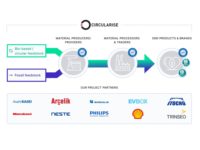Elemica and Crossinx Deliver Blockchain Pilot for Chemical Manufacturers

WAYNE, PA – Elemica, a digital supply network for process manufacturing industries, announced the completion of a successful blockchain pilot project between leading global chemical manufacturers as part of an innovation initiative testing new technologies that will redefine B2B processes and support digital transformation.
In the pilot program, Elemica and crossinx, a network for financial business collaboration solutions, exist as nodes on a public blockchain, connecting structured data with unstructured data, such as documents, to enable multi-tier payment. In the pilot, two large global chemical companies facilitated document and data transfer of invoices, purchase orders, delivery tenders and proof-of-delivery posts. With the ability to connect to a digital network, blockchain functionality can be made accessible to support a many-to-many connection of companies, facilitating payment processing.
“Similar to any new technology, there is a period of learning and evolution before adoption,” said Arun Samuga, CTO of Elemica. “We like what we see so far and are identifying areas of clear applicability of the technology.”
Elemica’s blockchain pilot project tested the ability to use blockchain to support a many-to-many architecture. Blockchain technology can be used to break supply chain data out of silos and reveal this information to all trading partners regardless of the network to which they are connected.
“Our goal is to use the blockchain to automate document exchange along the supply chain and make it more transparent. This is the basis for our Supply Chain Finance solutions," explained crossinx CEO and founder Marcus Laube.
The benefits of this capability with blockchain could lead to the feasibility of employing a trustless, intermediary-free, decentralized standard to exchange information between different stakeholders; simplifying existing business processes and making them smarter; auto-ordering based on IoT information; automated PO confirmations; auto-invoice creation based on Pickup or PoD; auto-matching of invoices and auto-payments.
The success of the blockchain pilot project shows that the new technologies brings value to supply chains and businesses through the sharing of information, workflows and economies.
Looking for a reprint of this article?
From high-res PDFs to custom plaques, order your copy today!







